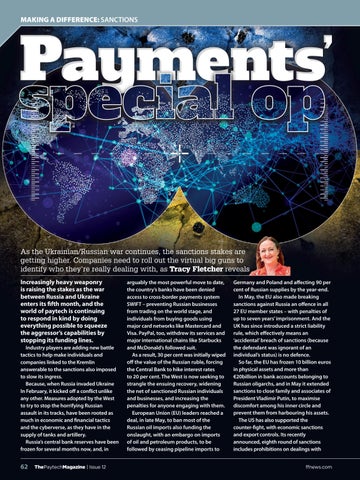MAKING A DIFFERENCE: SANCTIONS
As the Ukrainian/Russian war continues, the sanctions stakes are getting higher. Companies need to roll out the virtual big guns to identify who they’re really dealing with, as Tracy Fletcher reveals Increasingly heavy weaponry is raising the stakes as the war between Russia and Ukraine enters its fifth month, and the world of paytech is continuing to respond in kind by doing everything possible to squeeze the aggressor’s capabilities by stopping its funding lines. Industry players are adding new battle tactics to help make individuals and companies linked to the Kremlin answerable to the sanctions also imposed to slow its ingress. Because, when Russia invaded Ukraine In February, it kicked off a conflict unlike any other. Measures adopted by the West to try to stop the horrifying Russian assault in its tracks, have been rooted as much in economic and financial tactics and the cyberverse, as they have in the supply of tanks and artillery. Russia’s central bank reserves have been frozen for several months now, and, in
62
ThePaytechMagazine | Issue 12
arguably the most powerful move to date, the country’s banks have been denied access to cross-border payments system SWIFT – preventing Russian businesses from trading on the world stage, and individuals from buying goods using major card networks like Mastercard and Visa. PayPal, too, withdrew its services and major international chains like Starbucks and McDonald’s followed suit. As a result, 30 per cent was initially wiped off the value of the Russian ruble, forcing the Central Bank to hike interest rates to 20 per cent. The West is now seeking to strangle the ensuing recovery, widening the net of sanctioned Russian individuals and businesses, and increasing the penalties for anyone engaging with them. European Union (EU) leaders reached a deal, in late May, to ban most of the Russian oil imports also funding the onslaught, with an embargo on imports of oil and petroleum products, to be followed by ceasing pipeline imports to
Germany and Poland and affecting 90 per cent of Russian supplies by the year-end. In May, the EU also made breaking sanctions against Russia an offence in all 27 EU member states – with penalties of up to seven years’ imprisonment. And the UK has since introduced a strict liability rule, which effectively means an ‘accidental’ breach of sanctions (because the defendant was ignorant of an individual’s status) is no defence. So far, the EU has frozen 10 billion euros in physical assets and more than €20billion in bank accounts belonging to Russian oligarchs, and in May it extended sanctions to close family and associates of President Vladimir Putin, to maximise discomfort among his inner circle and prevent them from harbouring his assets. The US has also supported the counter-fight, with economic sanctions and export controls. Its recently announced, eighth round of sanctions includes prohibitions on dealings with ffnews.com





















